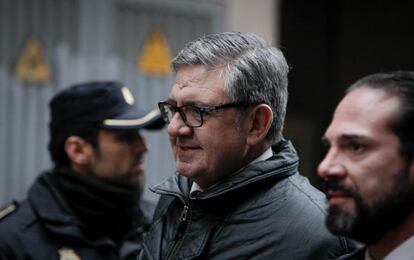Ties that have Royal Household in a bind laid bare in Nóos investigation
Palace secretary and Duke of Palma seek to distance king’s family from scandal

Almost everybody has fond memories of a particular schoolteacher. For Princess Elena, the eldest child of King Juan Carlos, that person was Carlos García Revenga, the secretary to the royal daughters who also taught the Duchess of Lugo at Madrid’s Santa María del Camino high school. Revenga, 58, last month became the first member of the Royal Household to be named as a suspect in the Nóos case embroiling the king’s son-in-law, Iñaki Urdangarin.
The relationship between Revenga and Elena extended to her younger sister, Cristina, and when the two married, in 1995 and 1997 respectively, to their husbands, Jaime de Marichalar and Urdangarin. With the passing of time Revenga became “much more than a secretary,” say sources at the Zarzuela palace. “He was by Elena’s side throughout her divorce. He is like an uncle to Froilán [Elena’s eldest son]. When Froilán had his accident [a gunshot wound to the foot in 2012] he did not leave his side. He is very protective of the princesses and their children. He also forged a great friendship with Cristina and Iñaki. They love him and he loves them.”
Revenga was a witness at Elena’s wedding, and at the ceremony of union between Cristina and Urdangarin, who became the Duke of Palma, the royal secretary’s daughter was a page. Princess Cristina is her godmother.
It is little surprise then that as the net of the embezzlement investigation into Urdangarin’s business dealings through his not-for-profit Nóos Institute tightens around the royal family, both men have sought to deny any involvement on the part of Cristina.
With the passing of time Revenga became “much more than a secretary”
Urdangarin’s erstwhile business partner and co-defendant, Diego Torres, furnished the investigating judge with emails he claims prove that the king was fully aware of Urdangarin’s projects and actively supported them. These emails, say Torres’ lawyers, also indicate that Revenga was consulted “on everything.”
Both the royal secretary and the Duke of Palma took the stand last month and were quizzed over the princess’s role at Nóos. “None whatsoever,” was Urdangarin’s reply. “She was a person I confided in.” Throughout his testimony the duke maintained a strategy of attempting to distance the royal family from his business affairs. He attributed Torres’ emails to an attempt to “alter the focus of this investigation.”
Before testifying, Urdangarin read a prepared statement: “The Royal Household did not opine or advise on, authorize or support any of the activities that I carried out at the Nóos Institute.”
Revenga’s relationship with the princesses extended beyond official acts to accompanying them to bullfights and on skiing holidays. This alliance naturally evolved into business ventures embarked on by the princesses and Revenga was named as treasurer at Nóos when the board of directors was announced in September, 2003; Urdangarin as president; Torres, vice president; Miguel Tejeiro, secretary general, and Princess Cristina, spokesperson. The latter is the only person yet to be named as an official suspect in the case by the investigating judge.
Testifying immediately after the duke on February 23, Revenga was evasive in his responses. “Do you know what Doña Cristina did there?” the prosecutor asked. “At the Nóos Institute?” Revenga replied. “Nothing.”
“Of course, that’s what the question is driving at. Why name somebody as a spokesperson if they’re not going to do anything? Do you know of any reason? Were you named to do nothing as well? Maybe you know then: Why was Doña Cristina named as spokesperson?”
“I really have no idea.”
Tu suscripción se está usando en otro dispositivo
¿Quieres añadir otro usuario a tu suscripción?
Si continúas leyendo en este dispositivo, no se podrá leer en el otro.
FlechaTu suscripción se está usando en otro dispositivo y solo puedes acceder a EL PAÍS desde un dispositivo a la vez.
Si quieres compartir tu cuenta, cambia tu suscripción a la modalidad Premium, así podrás añadir otro usuario. Cada uno accederá con su propia cuenta de email, lo que os permitirá personalizar vuestra experiencia en EL PAÍS.
En el caso de no saber quién está usando tu cuenta, te recomendamos cambiar tu contraseña aquí.
Si decides continuar compartiendo tu cuenta, este mensaje se mostrará en tu dispositivo y en el de la otra persona que está usando tu cuenta de forma indefinida, afectando a tu experiencia de lectura. Puedes consultar aquí los términos y condiciones de la suscripción digital.








































